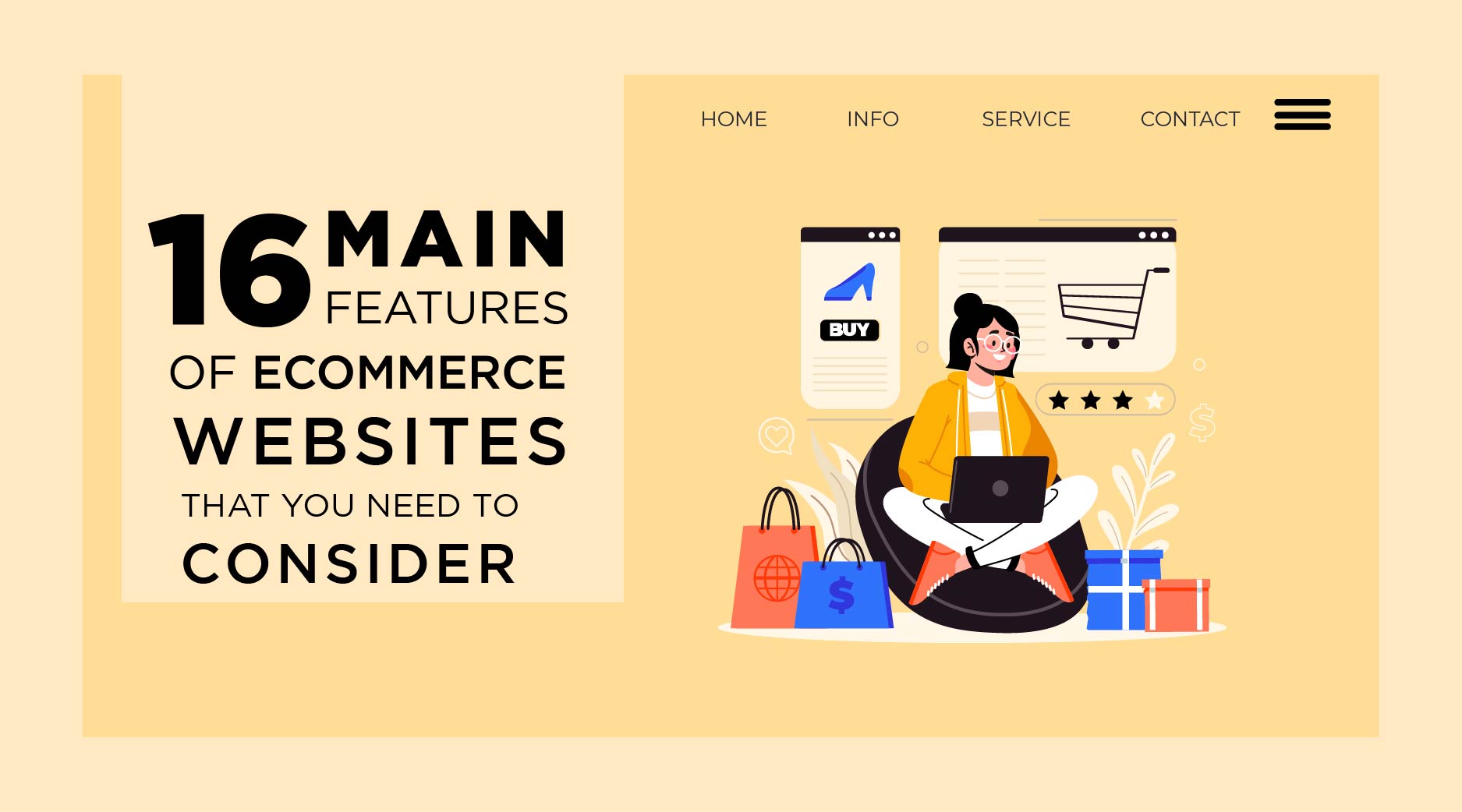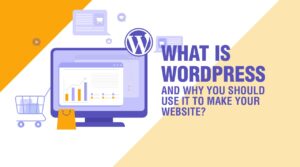In this digital world, business of e-commerce is growing rapidly than ever and so are new and main features of ecommerce websites. While there are thousands of them on the Internet, some e-commerce websites barely survive while others keep on to generate great revenues every day.
Those who are at the apex of ecommerce business, include gigantic companies like Amazon and eBay. It’s not hard to decipher the secret behind their success. They generally do things that everyone does but strive to do them differently.
Their primary focus is on perfecting their fundamentals and main features of ecommerce websites such as user interface (UI), user experience (UX), fast and reliable hosting, security etc. and post working on these things they work on aspects which can make their website functional, quick, safe and visually appealing.
All ecommerce websites are unique in their respective ways but their main features of ecommerce websites remain the same. Trends on ecommerce website design like seamless animation, 360◦ product previews, advanced filtering, and dynamic product search have further boosted innovation.
But, trends and innovation alone don’t guarantee conversion rates or solid user experiences. There are certain key features of ecommerce websites that every e-commerce site should have to stay relevant and up to date.
In this blog, we’ll give you an overview of some of these main features of ecommerce websites that will give you an idea on what constitutes a functional, high converting ecommerce website.
Also Read: How to make your website eye-catchy
Table of Contents
1. Domain NFame
A domain name is the front door entrance to your business. A domain name assumes the responsibility for getting a suitable and relevant audience to your website.
A domain name can make the difference between users browsing your website or ending up on your competitor’s site. Choosing a domain name requires a lot of research. You should select a domain name that is relevant to your business and is easy to remember.
Also Read: Why Website is Important for our Business
2. Company Logo
One of the main features of ecommerce websites, A logo acts as the primary visual component of the overall brand identity of your company. Thus it becomes essential that you put an extra emphasis while designing it.
The impact of the logo of an e-commerce website is direct on the customers, so you should ensure that it is unique, catchy and connectable to the audience. Make sure the logo has the right color combination, graphic design and typography so that it helps customers in brand retention.
3. Tagline
Along with your business name, your company’s tagline also matters the same. A basic feature of ecommerce website, the tagline represents your company’s vision and mission. While creating a suitable tagline you must ensure that it covers everything from the image of your business to the summary of your products and services.
4. Branded Web-design
This shouldn’t come to you as a surprise but your ecommerce website acts as your new online in-store display.
Since there is high competitiveness in the ecommerce landscape, in order to succeed- it is absolutely important for the design of your ecommerce website to encapsulate its characteristics and qualities. Also one of the essential features of ecommerce websites.
Since the competition in online world is increasing day by day, a high-quality website design is a must-to-have business asset in ecommerce. Businesses require an ecommerce platform that both comprises building blocks for excellent website design and permits flexibility for design flourishes that display individual brand identities.
5. Call-To-Action
Call-To-Action directs the attention of website visitors from confusion to the important content based on their needs. CTAs must be placed at prominent positions on an ecommerce website and should use a fill color that stands out from its background clearly.
Also Read: Call to Action
6. Easy Navigation
One of the key features of ecommerce websites, a non-confusing navigation is a core pillar of a well built website.
A great ecommerce website must be as easy to navigate as possible, and should possess advanced search powered by artificial intelligence to assist website visitors explore relevant products as quickly as possible.
Above everything, search & navigability are crucial to providing seamless and direct ecommerce experiences that boosts conversions.
The two main facets of web design that help to develop a relationship between users and products are – UI (User Interface) and UX (User Experience). These two aspects combined determine the navigability of your ecommerce site.
Reaction of users with regard to the site can be determined with the help of the user interface. UI takes in consideration the technical features of a website. The website visitors follow all instructions to go through the website if they find it interesting enough.
UX, on the other hand, takes into account how the user feels when browsing your ecommerce website.
Also Read: Types of websites you can create in 2021
7. User-focused personalized experience.
Ecommerce is primarily for the site visitors, users and store customers who buy products and services from that business.
Personalized user experience is a non-ignorable feature of ecommerce websites. Business professionals should understand that no customer should ever be taken for granted. This insight becomes more applicable especially in case of ecommerce, where website visitors abandon a potential purchase with a single click.
Every facet of a company’s ecommerce website should be customized towards creating superior, personalized experiences for every user and their individual customer journeys.
A good ecommerce website will permit a company to utilize customer data in order to personalize shopping experiences for visitors across multiple channels.
Artificial intelligence (AI) can help recommend products that automatically appear and adapt to users’ preferences in real time, on every click. User wish lists of registered accounts can help companies further personalize product recommendations and promotions, while permitting shoppers to easily save items for future purchases.
In addition to all the aforementioned aspects; checkout, order management, and returns must all be seamless and hassle-free. Tiresome account signup forms can result in potential buyers abandoning their carts.
That is why, every ecommerce website’s checkout must feature an additional short form for quick purchasing. A well-designed ecommerce platform should also feature order shipment transparency, painless returns and a streamlined customer experience that goes beyond the purchase.
8. High-quality product images and videos
These days posting a single photo with a few bullet points and a price tag won’t cut it. Those days in which this used to work are long gone.
Nowadays, customers want to see multiple angles of the product used in different environments. They want to be able to zoom the product and observe it carefully.
To insert images in your ecommerce website, you need to look out for many technical considerations. Images that fail or take too long to load can result in a significant drop-off rate of close to 40%.
Images are essential features of ecommerce websites. And it is rightly said that images sell better than texts.
Ecommerce websites must showcase multiple images per product. The images need to be of high-resolution and optimized for page load.
9. Image Slider
Avoid displaying randomly one image after the other. Image Slider is one of the most used visual display modes in web design. You can add this basic feature of ecommerce website to tell your story with sliders. It captures the attention of your website visitors and gives a professional feel and look to your site.
10. Integration with your physical retail store
When shopping online through your ecommerce website, customers should be able to know whether you have a physical retail store and whether they can find a particular product in your nearest store or not.
While building a good ecommerce platform, you should integrate a feature that adds a find-in-store button linked to geolocation and brick-and-mortar inventory.
Integration of ecommerce platform with your physical retail location empowers sales executives with the ability to remove walked sales with access to digital inventory, seamless ordering, and quick delivery.
11. Mobile-Friendly Website
Stats show us that smart phone shopping accounts for 50% of online transactions. With a suitable responsive ecommerce website, site content automatically adapts to whatever device is accessing it to offer the most user-friendly experience.
A key feature of ecommerce websites and an important tenet of navigation and user experience design; responsiveness must translate to all screen sizes and all devices. Businesses cannot afford to create an amazing desktop ecommerce site that hardly loads on a mobile phone.
Mobile responsive design can no longer be considered an afterthought — it must be your primary focus. Businesses must ensure that their ecommerce website is capable to seamlessly scale their online stores to every possible screen size and device.
12. Content
Content is one of the main features of e-commerce websites. Content helps websites gain top ranks in SERPs (Search Engine Results Pages).
Businesses should ensure the content they’re putting on their ecommerce website is fresh and unique. Eliminate any duplicate meta description, product description, and blog post and add relevant keywords to every page of your website.
This ensures improvement of the site quality and at the same time increases the keyword density while avoiding plagiarism.
13. User generated reviews
Majority of the users who visit an ecommerce website’s product page read reviews about it. It may be safe to assume the percent to be 95%. More than 50 % of purchasers will only buy a product if it has 4 or more stars.
Having negative reviews isn’t always a sale killer. Here’s why- having negative reviews can often mean that you don’t censor user dissatisfaction and are transparent with your products. This also increases the credibility of the products who have got positive reviews. This practice projects you as honest and not fake.
Depending on the functionality of a website, ecommerce platforms can utilize plugins from the highly popular review platforms like Yelp, Facebook, and Foursquare. You can also take one step forward by using reviews as user-generated content to present a social proof and build loyal fans.
14. Wish Lists
Wish lists are great, you can create one for electronics, one for books to read, one for fashion, one for skincare and one for holiday gift ideas.
It is a quite popular and widely appreciated key feature of ecommerce websites. With wish lists you can shop, save, and share your favorite products.
Ecommerce sites that are not integrating wish lists in their platforms are leaving a large bracket of revenue on the virtual table.
What’s good than having purchasers save items they want and will most likely buy in the future? It is a marketer’s dream come true. It can also be used for remarketing campaigns.
Wish lists are an opportunity to share a brand with new customers. When site visitors share wish lists with their family and friends, it drives free traffic with built-in social proof to a website.
15. Relevant Frequently Asked Questions (FAQs)
Your website visitors might have certain specific questions regarding the products or procedures of your business. The FAQ section is the primary go-to destination for such visitors. So, while designing your dream ecommerce website, add relevant FAQs to an easily locatable space. The customer will then have the option to open the FAQ page and find answers to their queries rather than emailing or calling you.
Some examples of FAQs include:
- What type of customer service do you provide?
- How to change my shipping address?
- My order is damaged/lost, what should I do?
- How to track my order(s)?
- How to cancel my order(s)?
- What are the payment modes do you accept?
16. Search Bar
Search is the most essential feature of ecommerce websites. A search bar on your website is as mandatory as oxygen is for living beings. It massively helps your visitors to obtain the information they’re looking for. While designing your site make sure to make it prominent and clearly visible.
Conclusion
The first and foremost thing you need to keep in mind while building an e-commerce website is that it must be user-friendly. Your website should have all the important features like clean UI/UX, sharp logo, clear CTA, seamless navigation, FAQs, search bar and more.
To make such functional and feature-rich ecommerce website you may need to hire an agency for it. Sampark Infoways is a leading e-commerce design and development company based in Raipur and Mumbai, India.
We at Sampark Infoways in our experience of 10+ years have served over 100+ clients of different industries and provided them with best and reliable ecommerce development solutions.
Our other services include IT solutions, Website design and development, Software development, Mobile App development, Digital Marketing, SEO, and many more. Visit our site for more info.



